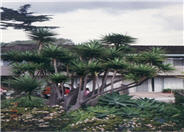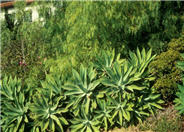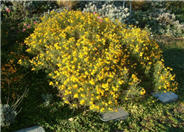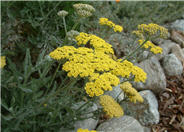
Common name:Gloriosa Yucca, Spanish Dagger
Botanical name:Yucca gloriosa
This clumping palm relative will reach 10' to15' tall and has large, green, sword-like leaves with white flowers in spring and summer. Its broad, medium green leaves blend with either tropical or desert theme landscapes.

Common name:Fox Tail Agave, Velvet Agave
Botanical name:Agave attenuata
This Agave has a dramatic tropical form. Even light frost can damage its succulent leaves. It is great for containers. In the low desert, partial sun will be best. If it becomes top heavy, simply cut and stick in the ground to root. It is not a fast grower and has light green foliage. It will also die after flowering but pups around the mother will survive. Distinctive with its large rosette of leaves perched on a long curving trunk, it is a native from Mexico.

Common name:Perennial Marigold
Botanical name:Tagetes lemmonii
This larger perennial will grow to 6' tall and has small, light green leaves with yellow mustard colored flowers that bloom in winter and spring. Cut back to within 6" of the ground to refresh and reduce the size of the plant. This plant is a riot of color!

Common name:Yarrow Moonshine
Botanical name:Achillea 'Moonshine'
Pale yellow flowers appear to float on long, slender stems. Leaves are green to gray-green leaves, which are flatter and less divided than those of the Achillea millefolium. Yarrows propagate easily from rooted cuttings or division, which should be performed in the early spring or fall. Following bloom, one should dead head the plant and divide the clumps when it appears crowded.

Common name:Succulents
Botanical name:Aeonium species
These plants are one of the most useful succulents, due to their decorative effects and sculpturesque quality. The branched stems hold a wide rosetta of either light green or purple leaves. The flowers appear in long, clustered form. They need some shade in hotter areas. Prostrate forms are low-growing, and spreading.
Designer:
Photographer: GardenSoft
Maintain a two to four inch layer of mulch on the soil surface to reduce weeds, infiltrate rain water, and reduce compaction.
Attract, or buy beneficial insects such as ladybugs and lacewings to control pest outbreaks in your garden.